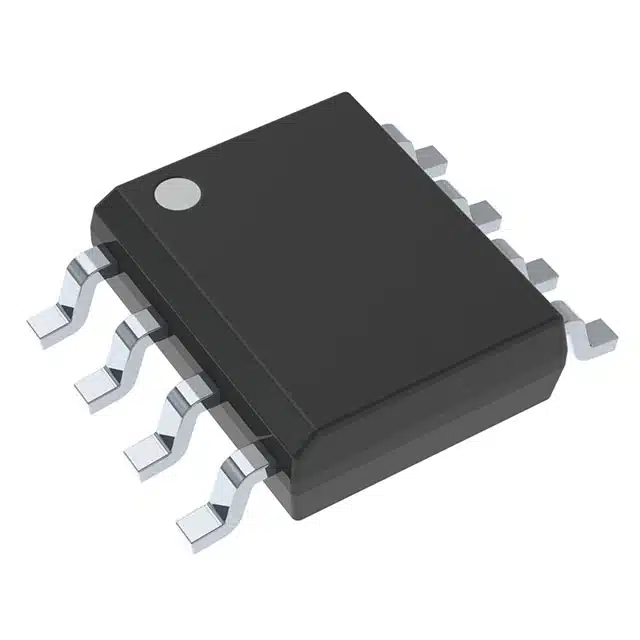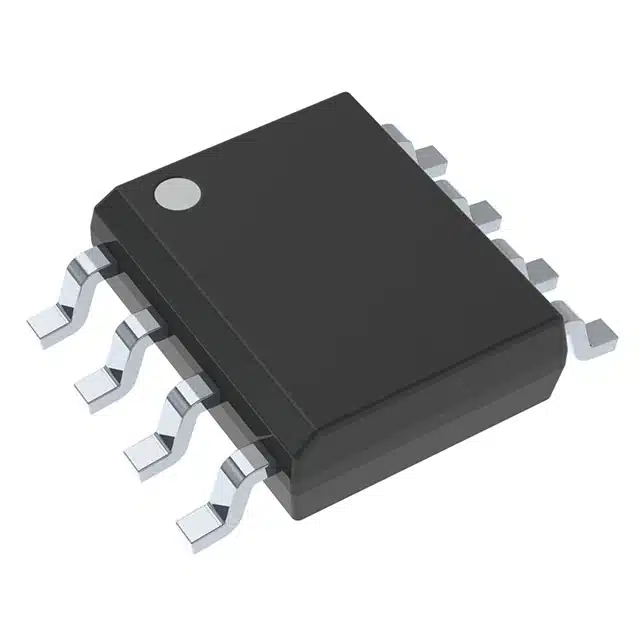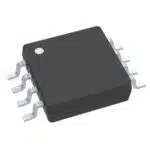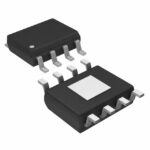
The TMCS1107A3UQDRQ1 is a Hall-Effect current sensor designed for precise current measurement in demanding environments. It plays a vital role in automotive systems, especially in electric and hybrid vehicles, where accurate current sensing ensures efficient energy management. The global Hall-Effect current sensor market, valued at $1.2 billion in 2023, is projected to grow to $2.5 billion by 2032, driven by the rising adoption of electric vehicles. With features like high accuracy, galvanic isolation, and superior reliability, the TMCS1107A3UQDRQ1 stands out as a trusted solution for modern automotive applications.
Key Takeaways
-
The TMCS1107A3UQDRQ1 is a sensor that measures electric current. It is very accurate and important for electric and hybrid cars.
-
This sensor has features like high accuracy, strong isolation, and works well in different temperatures. It performs reliably even in tough car conditions.
-
Adding this sensor helps save energy, keeps systems safe, and makes cars work better. It is very useful in modern cars.
-
The sensor reduces power loss because it has low resistance. This helps cars use energy more efficiently.
-
It can measure both DC and AC currents. This makes it helpful for things like managing batteries and controlling motors.
Understanding TMCS1107A3UQDRQ1
What is TMCS1107A3UQDRQ1?
The TMCS1107A3UQDRQ1 is a Hall-effect current sensor designed for precise current measurement in automotive systems. It uses advanced galvanic isolation to measure both DC and AC currents with high accuracy. This sensor is particularly suited for electric and hybrid vehicles, where efficient energy management is critical. Its robust design ensures reliable performance in harsh automotive environments, making it a trusted choice for modern vehicle applications.
Key Features and Technical Specifications
The TMCS1107A3UQDRQ1 offers a range of features and specifications that make it ideal for automotive systems. These include high accuracy, excellent linearity, and temperature stability. The following table highlights its technical specifications:
|
Specification |
Details |
|---|---|
|
AEC-Q100 qualified |
Yes |
|
Temperature Grade |
–40°C to 125°C |
|
Total error |
±1% typical, ±3% maximum |
|
Sensitivity options |
50 mV/A, 100 mV/A, 200 mV/A, 400 mV/A |
|
Operating supply range |
3 V to 5.5 V |
|
Signal bandwidth |
80 kHz |
|
Isolation rating |
3-kVRMS |
|
Lifetime working voltage |
420 V |
|
Maximum supply current |
6 mA |
|
Functional safety capabilities |
Yes |
Additional features include:
-
Galvanically isolated Hall-effect current sensing.
-
Low-drift, temperature-compensated signal chain with less than 3% full-scale error.
-
Integrated electrical shielding for common-mode rejection and transient immunity.
Importance in Automotive Systems
The TMCS1107A3UQDRQ1 plays a critical role in electric and hybrid vehicles. Its high accuracy ensures precise current measurement, which is essential for battery management systems and motor control. The sensor’s excellent linearity and temperature stability enhance its reliability in dynamic automotive environments. Its galvanic isolation, with a 420-V lifetime working voltage, ensures safety and efficiency in high-voltage systems. Additionally, its low conductor resistance minimizes power loss, contributing to overall energy efficiency.
By integrating the TMCS1107A3UQDRQ1, automotive manufacturers can achieve better energy management, improved system safety, and enhanced vehicle performance. This sensor supports the growing demand for sustainable and innovative automotive technologies.
Applications of TMCS1107A3UQDRQ1 in Automotive Systems
Role in Battery Management Systems (BMS)
The TMCS1107A3UQDRQ1 plays a vital role in battery management systems by ensuring accurate current measurement. This precision is essential for monitoring charging and discharging currents in electric and hybrid vehicles. The sensor provides galvanic isolation between the current path and the circuitry, enhancing safety in high-voltage environments.
Key features of the TMCS1107A3UQDRQ1 make it highly reliable for BMS applications:
-
Accurate DC and AC current measurement.
-
Excellent linearity and temperature stability.
-
Less than 3% full-scale error across a wide temperature range of –40°C to +125°C.
These capabilities allow automotive manufacturers to optimize battery performance and ensure safe operation under varying conditions.
Contribution to Electric Motor Control
Electric motor control systems rely on precise current sensing for efficient operation. The TMCS1107A3UQDRQ1 contributes to this efficiency through its high accuracy and low power loss. Its inherent galvanic insulation supports a 420-V lifetime working voltage and 3-kVRMS basic isolation, ensuring safety and reliability in motor control applications.
Additional features enhance its performance in electric motor systems:
-
Integrated electrical shielding improves common-mode rejection and transient immunity.
-
High accuracy enables precise feedback for motor control, preventing overcurrent situations.
By integrating this sensor, automotive systems achieve better motor performance and energy efficiency, which are critical for electric and hybrid vehicles.
Use in Power Management and DC-DC Converters
The TMCS1107A3UQDRQ1 is a key component in power management systems and DC-DC converters. It ensures accurate current measurement, which is crucial for maintaining efficient power delivery. The sensor’s low conductor resistance minimizes power loss, reducing thermal dissipation and improving overall system reliability.
The following table highlights its advantages in power management applications:
|
Advantage |
Description |
|---|---|
|
High Accuracy |
Provides precise current measurement with <3% full-scale error. |
|
Low Power Loss |
Minimizes energy loss and heat generation. |
|
Galvanic Isolation |
Ensures safety with 420-V lifetime working voltage and 3-kVRMS basic isolation. |
|
Excellent Common-Mode Rejection |
Enhances performance with integrated electrical shielding. |
|
Multiple Sensitivity Options |
Offers flexibility with various sensitivity configurations. |
|
Unidirectional and Bidirectional |
Supports both unidirectional and bidirectional current sensing. |
These features make the TMCS1107A3UQDRQ1 an ideal choice for automotive power management, ensuring efficient energy use and system safety.
Integration of TMCS1107A3UQDRQ1 with Automotive Components
Compatibility with Vehicle Control Units (VCUs)
The TMCS1107A3UQDRQ1 seamlessly integrates with Vehicle Control Units (VCUs), which serve as the central hub for managing various automotive systems. Its high accuracy and galvanic isolation ensure reliable current measurement, even in high-voltage environments. This compatibility allows VCUs to monitor and regulate energy flow efficiently, enhancing overall vehicle performance.
The sensor’s ability to measure both DC and AC currents with minimal error supports precise control of critical systems like battery management and motor operation. Its robust design ensures consistent performance across a wide temperature range, making it suitable for the demanding conditions of automotive applications. By incorporating the TMCS1107A3UQDRQ1, VCUs can achieve better energy management and improved system reliability.
Integration with Sensors and Actuators
The TMCS1107A3UQDRQ1 enhances the performance of sensors and actuators in automotive systems by providing accurate and stable current measurements. This capability ensures that these components operate efficiently and respond effectively to system demands.
The following table highlights how the TMCS1107A3UQDRQ1 improves sensor and actuator performance:
|
Feature |
Description |
|---|---|
|
High Accuracy |
Provides <3% full-scale error across the device temperature range. |
|
Excellent Linearity |
Ensures precise current measurement with minimal deviation. |
|
Temperature Stability |
Operates effectively across a wide temperature range of –40°C to +125°C. |
|
Galvanic Isolation |
Offers 420-V lifetime working voltage and 3-kVRMS basic isolation for enhanced safety. |
|
Low Conductor Resistance |
Minimizes power loss and thermal dissipation, improving overall efficiency. |
|
Integrated Electrical Shielding |
Enables excellent common-mode rejection and transient immunity, enhancing reliability. |
|
Multiple Sensitivity Options |
Allows operation from a single 3-V to 5.5-V power supply, improving supply noise rejection. |
|
Unidirectional and Bidirectional |
Available sensing variants to accommodate different application needs. |
These features make the TMCS1107A3UQDRQ1 a valuable addition to automotive systems, ensuring optimal performance and reliability of sensors and actuators.
Enhancing System Efficiency and Safety
The TMCS1107A3UQDRQ1 significantly improves system efficiency and safety in modern vehicles. Its galvanically isolated Hall-effect current sensing ensures accurate DC and AC current measurement, which is critical for maintaining energy efficiency. The sensor’s low conductor resistance reduces power loss, while its integrated electrical shielding enhances reliability by rejecting common-mode noise and transient disturbances.
The following table outlines the features that contribute to system efficiency and safety:
|
Feature |
Description |
|---|---|
|
Measurement Capability |
Galvanically isolated Hall-effect current sensor capable of DC or AC current measurement. |
|
Accuracy |
High accuracy with <3% full-scale error across the device temperature range. |
|
Isolation |
420-V lifetime working voltage and 3-kVRMS basic isolation between current path and circuitry. |
|
Certifications |
UL 1577 component recognition, IEC/CB 62368-1. |
|
Power Supply |
Operates from a single 3-V to 5.5-V power supply, improving supply noise rejection. |
By integrating the TMCS1107A3UQDRQ1, automotive manufacturers can enhance energy management, reduce thermal dissipation, and ensure the safety of high-voltage systems. These improvements support the development of efficient and reliable vehicles, meeting the growing demand for sustainable automotive technologies.
Advantages of TMCS1107A3UQDRQ1 in Modern Vehicles
Improved Efficiency and Reliability
The TMCS1107A3UQDRQ1 enhances efficiency and reliability in automotive systems. Its low conductor resistance minimizes power loss, reducing heat generation and improving energy utilization. This feature ensures that vehicles operate with optimal energy efficiency, which is critical for electric and hybrid vehicles. The sensor’s high accuracy and excellent linearity provide precise current measurements, enabling better control of energy flow in systems like battery management and motor control.
The device’s robust design ensures consistent performance across a wide temperature range, from -40°C to 125°C. This capability makes it suitable for demanding automotive environments. Additionally, its galvanic isolation, rated for a 420-V lifetime working voltage, ensures safe operation in high-voltage systems. These features collectively contribute to the reliability of modern vehicles, supporting their long-term performance and durability.
Contribution to Vehicle Safety and Innovation
The TMCS1107A3UQDRQ1 plays a significant role in advancing vehicle safety features. Its high accuracy and excellent linearity ensure precise current sensing, which is essential for monitoring critical systems. The sensor’s galvanic insulation provides a 420-V lifetime working voltage and 3-kVRMS basic isolation, enhancing safety in high-voltage environments.
Other features that contribute to safety include:
-
Integrated electrical shielding for common-mode rejection and transient immunity.
-
Reliable operation over a wide temperature range of -40°C to 125°C.
These capabilities make the TMCS1107A3UQDRQ1 a trusted component in safety-critical applications, such as battery management and motor control. By enabling precise and reliable current measurement, the sensor supports the development of innovative safety technologies in modern vehicles.
Supporting Sustainability in Automotive Technology
The TMCS1107A3UQDRQ1 promotes sustainability in automotive technology by improving energy efficiency and reducing waste. Its low conductor resistance minimizes power loss and thermal dissipation, ensuring efficient energy use. The sensor’s galvanic isolation and integrated electrical shielding enhance system reliability, reducing the need for frequent maintenance or replacements.
The following table highlights its contributions to sustainability:
|
Feature |
Description |
|---|---|
|
Power Loss Minimization |
Low conductor resistance minimizes power loss and thermal dissipation. |
|
Galvanic Isolation |
Provides a 420-V lifetime working voltage and 3-kVRMS basic isolation between current path and circuitry. |
|
Integrated Electrical Shielding |
Enhances common-mode rejection and transient immunity, contributing to safety and reliability. |
By integrating the TMCS1107A3UQDRQ1, automotive manufacturers can create vehicles that are not only efficient but also environmentally friendly. This sensor supports the industry’s shift toward sustainable and innovative automotive technologies.
Future Potential of TMCS1107A3UQDRQ1
Advancements in Automotive Systems
The TMCS1107A3UQDRQ1 is poised to drive advancements in automotive systems by enabling precise current sensing. Its high accuracy and excellent linearity ensure reliable performance, even in complex energy management systems. These features make it an essential component for improving battery management, motor control, and power distribution. As automotive technology evolves, the demand for sensors that can operate efficiently in high-voltage environments will grow. The TMCS1107A3UQDRQ1, with its robust design and temperature stability, is well-suited to meet these challenges.
By integrating this sensor, manufacturers can enhance the efficiency and safety of electric and hybrid vehicles. Its ability to minimize power loss and thermal dissipation contributes to better energy utilization. This capability supports the development of vehicles that are not only more efficient but also environmentally friendly.
Role in Electric and Autonomous Vehicles
The TMCS1107A3UQDRQ1 plays a critical role in the development of electric and autonomous vehicles. Its features ensure accurate current measurement, which is vital for power management and system stability. The following table highlights its contributions:
|
Feature |
Description |
|---|---|
|
High Accuracy |
Provides high accuracy in current measurement, essential for power management in vehicles. |
|
Excellent Linearity |
Ensures reliable performance in monitoring current flow. |
|
Low Conductor Resistance |
Minimizes power loss and thermal dissipation, improving overall efficiency. |
|
Galvanic Insulation |
Offers 420-V lifetime working voltage and 3-kVRMS basic isolation, enhancing safety. |
|
Integrated Electrical Shielding |
Enables excellent common-mode rejection and transient immunity, crucial for vehicle stability. |
|
Temperature Stability |
Maintains performance across a wide temperature range (-40°C to +125°C). |
|
Bidirectional Sensing Variants |
Supports both unidirectional and bidirectional current sensing, increasing versatility. |
These features make the TMCS1107A3UQDRQ1 a valuable asset in electric vehicles, where energy efficiency is paramount. In autonomous vehicles, its reliability ensures the seamless operation of critical systems, enhancing safety and performance.
Potential for Broader Applications Beyond Automotive
While the TMCS1107A3UQDRQ1 excels in automotive systems, its potential extends to other industries. In renewable energy systems, it can optimize energy harvesting by accurately measuring current in solar inverters and wind turbines. Its ability to monitor power flow and detect faults ensures system safety and efficiency.
In industrial applications, this sensor can enhance the performance of motor drives and power supplies. Its high accuracy and galvanic isolation make it suitable for monitoring input and output currents in DC-DC converters. Additionally, its use in smart grids can improve energy distribution and fault detection, contributing to more reliable power systems.
The TMCS1107A3UQDRQ1’s versatility and robust design position it as a key player in advancing technology across various sectors.
The TMCS1107A3UQDRQ1 has revolutionized modern automotive systems with its advanced features and reliability. Its high accuracy and excellent linearity enable precise current measurements, while temperature stability ensures consistent performance in diverse conditions. Galvanic isolation enhances safety by supporting a 420-V lifetime working voltage. The sensor minimizes power loss through low conductor resistance, contributing to energy efficiency. With multiple sensitivity options, it adapts to various automotive applications. These qualities make it indispensable for electric and hybrid vehicles, where efficiency and safety are paramount. As electric and autonomous vehicles evolve, this sensor will play a pivotal role in shaping their future.
1. What makes the TMCS1107A3UQDRQ1 suitable for automotive systems?
The TMCS1107A3UQDRQ1 offers high accuracy, galvanic isolation, and excellent temperature stability. These features ensure reliable performance in demanding automotive environments. Its AEC-Q100 qualification further guarantees suitability for electric and hybrid vehicles.
2. Can the TMCS1107A3UQDRQ1 measure both DC and AC currents?
Yes, the TMCS1107A3UQDRQ1 can measure both DC and AC currents with precision. Its advanced Hall-effect technology ensures accurate current sensing for various automotive applications, including battery management and motor control.
3. How does the TMCS1107A3UQDRQ1 enhance vehicle safety?
The sensor provides galvanic isolation with a 420-V lifetime working voltage and 3-kVRMS basic isolation. These features protect high-voltage systems, ensuring safe operation in electric and hybrid vehicles.
4. What are the key applications of the TMCS1107A3UQDRQ1 in electric vehicles?
The TMCS1107A3UQDRQ1 is used in battery management systems, motor control, and power management. It ensures efficient energy use, precise current measurement, and system reliability, which are critical for electric vehicle performance.
5. Is the TMCS1107A3UQDRQ1 environmentally friendly?
Yes, the sensor minimizes power loss through low conductor resistance. This feature improves energy efficiency and reduces thermal dissipation, supporting sustainable automotive technologies.
See Also
Understanding MC9S12DJ256MFUE Specs for Automotive Use
Unveiling Key Automotive Features of FREESCALE MCF5251CVM140
Enhancing Automotive Performance with MC9S12XEP100 and NXP Microcontrollers
SPC56 Microcontrollers: Simplified Solutions for Engine Control
Three Effective Methods for Integrating MC9S12XET512VAG


